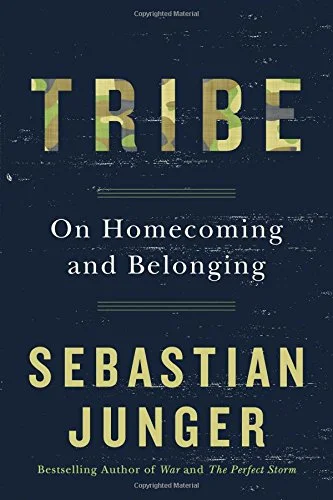Tribe
Tribe by Sebastien Junger
Junger’s thesis in Tribe is that somewhere in the evolution of mankind toward modern civilization we’ve lost some of the most basic aspects of our humanity, to wit: the sense of belonging, self-worth and community that were (and in some few cultures, still are) fundamental aspects of small tribal societies.
He uses some interesting examples and poses some troubling questions. During the European colonial push into the American wilderness, there were many cases documented of white men and women who were captured by the “savages” (American Indians), or who voluntarily fled to them, and did not want to return or fled back to them when “liberated” by their fellow Europeans. The reverse (e.g. Indians fleeing to white settlements) almost never happened. What was it about “savage” society that had such a powerful attraction to them?
At the beginning of the Germany’s WWII aerial bombardment of England, British authorities predicted that there was a high probability that both individuals and society would disintegrate and devolve into a bestial state of “every man for himself” chaos. What happened during the blitz was exactly the opposite: people pulled together and kept society functioning under awful circumstances; and when interviewed years later, many survivors remembered those terrible months as the best of their lives. Furthermore, levels of mental illness and suicide actually decreased dramatically during the blitz, to the astonishment of the experts.
In sum, Junger says that tribal societies are generally more egalitarian and less hierarchical than ours, with leadership based on skills and shifting, as needed, from warriors to peacemakers to little or no leadership. Everybody has a place and plays a part and because of this, there is an intense sense of self-worth and belonging. This same structure and these same emotions are replicated to a great degree at the platoon level in the modern military. And Junger believes that this is why veterans have such a difficult time reintegrating into peacetime society “back home”: they lose this intense sense of purpose and teamwork when plunged back into modern society (especially modern American society), which has become very atomized and hierarchical, focused on individual status, wealth and achievement.
Junger suggests that a consequence of the above is the skyrocketing rate and duration of Post-Traumatic Stress Disorder (PTSD) among returning soldiers. He posits that, in addition to their separation from a tribal culture (the military), America has created a culture of victimization around this malady, unwittingly catalyzing its growth. Instead of reintegrating veterans into society, they are “treated” with drugs, therapy and payments….and perversely encouraged to maintain their victim status. He states that levels of PTSD (or similar symptoms) are much lower among returning warriors in tribal societies than amongst those of civilized nations. In these cultures warriors are truly honored (and not just with formulaic lip service: “thank you for your service”), and that there are often elaborate rituals and support networks for reintegrating them back into the peacetime world.
My only caveat with Junger’s thesis come from a lifetime as a lay reader of tales of Europeans living with tribal peoples and anthropological studies of the same. My overall impression is that many of these cultures are much more rule- and taboo-bound than modern civilization, often with pretty serious consequences for transgressors, and can be violent and scary groups to live in, except for the very strong and violent themselves (e.g. the Yanomami of Venezuela and Brazil). That said, this is a very thought-provoking little book and recommended for anyone interested in “civilization and its discontents”.


